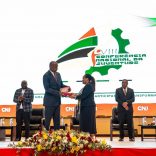Mozambique LNG Project receives award for supporting youth internships in Nampula, Cabo Delgado and ...
Mozambique: Entrepreneurial praise for government’s stimulus package – Carta

Image: Carta de Moçambique
Mozambican private sector businesspeople are satisfied with the economic stimulus package (PAE) announced this Tuesday (09-08) by President of the Republic, Filipe Nyusi. Of the 20 measures, the highlight goes to the reduction of Corporate Income Tax (IRPC) in agriculture from 32% to 10% [for some sectors].
After the event, the President of the Confederation of Economic Associations of Mozambique (CTA), Agostinho Vuma, said he was satisfied with the measures announced.
“The feeling is very satisfying. The set of measures announced by the president is part of a package that the private sector (the CTA) has been asking for since 2020, when we first faced the pandemic. But the most important thing is the that reduction in the IRPC – from 32% to 10% – is the figure preferred by the private sector,” Vuma said.
The President of CTA also said that the measures President Nyusi had launched pose a challenge and a set of tools for the private sector to take the lead in the economic development of the country. However, as for their duration, he said he hoped that the two-year implementation period would be extended to allow for their improvement.
Overall, Vuma said he hoped that the measures would generate greater production, a better business environment and greater productivity, allowing the private sector to contribute more to gross domestic product (GDP).
On the sidelines of the event, ‘Carta’ interviewed Muzila Nhatsave, a businessman and Secretary General of the Mozambican Association of Industrial Fisheries of Shrimp (AMAPIC). Nhatsave professed himself satisfied with the measures announced, especially the reduction of IRPC in the aquaculture sector.
“In our sector in particular, the issue of IRPC in aquaculture as an incipient activity is very welcome. This measure will, first, allow the capture of investments, but also mainly to seek knowledge. Aquaculture is a sensitive area, in which a lot of knowledge is needed on the part of those who do it and those who have experience in the sub-sector. There are other complementary measures, such as the Value Added Tax (VAT), when importing material for the activity. Therefore, the ecosystem is created for this activity to flourish and attract investment and, especially, expertise,” Nhatsave said.
We also interviewed operators in the tourism sector, such as entrepreneur and President of the Association of Travel Agencies and Tour Operators of Mozambique (AVITUM), Noor Momade. He also said his sector was pleased, especially with regard to reforms in the granting of visas.
“We in the area of tourism are very satisfied. After two years of suffering with the Covid-19 pandemic, and now that countries have started to ease restrictions, the measures announced by the president make us believe in a better future, and we want to believe that things will be different now. Specifically, we are pleased with the openness in granting different visas and the online visa, which will help tourism a lot,” Momade said. “With these measures, we hope that life in the sector will return to the way it was before the pandemic. We know that it will not happen overnight, but with work we hope that life will return,” he added.
On the sidelines of the event, ‘Carta’ also recorded comments by Simone Santi, the president of the Eurocam Association, which brings together all the European Chambers of Commerce in Mozambique. Santi focused his remarks on the impact of the reduction of VAT on import products and beyond, a measure that will attract even more foreign investors.
“We are satisfied with the reduction in VAT from 17% to 16%, because it is a sign that the country is reaching out to investors to create competitiveness and employment, and solve Mozambican’s problems, but through the creation of value. We are very pleased to note that foreign investors who produce under the ‘Made In Mozambique’ seal will have the best market. We are also pleased to hear that the energy, agriculture, fish farming and transport sectors have been granted a reduction of the [IRPC] rate from 36% to 10%,” Santi remarked.
The 20 measures announced by the president consist of reforms of fiscal, financial, and even bureaucratic scope, with a view to mitigating the current cost of living and accelerating the development of the national economy in the next two years.
By Evaristo Chilingue












Leave a Reply
Be the First to Comment!
You must be logged in to post a comment.
You must be logged in to post a comment.